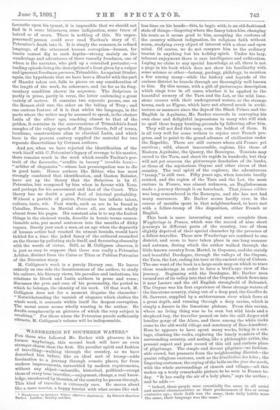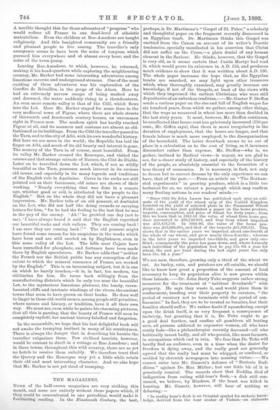WANDERINGS BY SOUTHERN WATERS.* Fon those who followed Mr. Barker
with pleasure in his former wayfaringa, this second book will have an even stronger charm than the first. His peculiar spirit and fashion of tr"elling—walking through the country, as we have described him before, like an ideal sort of tramp—adds fascination to a journey through remote places, far from modern improvements, untroubled by modern requirements, without any object—seientific, historical, political—except those of every true traveller,—enjoyment, change, a real know- ledge, uncoloured by theories, of the country he passes through. This kind of traveller is extremely rare. He moves about like a mere tourist, a happy tourist with what seems like end- * Wanderings by Southern Waters (Eastern Agwitaine), By Edward Harrison Barker. London: Bentley and eon. less time on his hands—this, to begin with, is an old-fashioned state of things—lingering where the fancy takes him, changing his route as it seems good to him, accepting the customs of the country without indignation, its religious faith without scorn, studying every object of interest with a clear and open mind. Of course, we do not compare him to the ordinary tourist in anything but his holiday spirit. Under his lazy, tolerant enjoyment there is rare intelligence and cultivation. Laying no claim to any special knowledge at all, there is not a page in his book which does not show his familiarity with some science or other—botany, geology, philology, to mention a few among many—while the history and legends of the curious district he travels through are thoroughly well known to him. By this means, with a gift of picturesque description which rings true in all cases, whether it be applied to the beautiful scenery of the Tarn and the Lot, or the wild lime- stone causes with their underground waters, or the strange towns, such as Figeac, which have not altered much in archi- tecture or manners since the days of the Black Prince and the- English in Aquitaine, Mr. Barker succeeds in conveying his own clear and delightful impressions to many who will wish to spoil these happy hunting-grounds by following after him.
They will not find this easy, even the boldest of them. It is all very well for some writers to rejoice over French pro- gress, and to point to the grand advance of civilisation under the Republic. There are still corners where old France yet survives ; wild, almost inaccessible, regions, like these of Eastern Aquitaine, the Quercy, the Rouergue. Tourists may crowd to the Tarn, and shoot its rapids in hundreds, but they will not yet overrun the picturesque desolation of its banks, or those of the mysterious Ouysse and other rivers of that country. The real spirit of the explorer, the adventurous "tramp," is still rare. Fifty years ago, when tourists hardly existed, and the region of the Tarn and the Lot, the most curious in France, was almost unknown, an Englishwoman made a journey through it on horseback. That femme velars. was long remembered in the Rouergue, and she has not had many successors. Mr. Barker seems hardly ever, in the course of months spent in that neighbourhood, to have met with a fellow-tramp of like disposition, either French or English.
This book is more interesting and more complete than Wayfaringe in Prance, which was the record of nine short journeys in different parts of the country, two of them slightly deprived of their special character by the presence of a fellow-traveller. These new Wanderings are confined to one district, and seem to have taken place in one long summer and autumn, during -which the author walked through the little-known country from Martel, in Guyenne, and the stately and beautiful Dordogne, through the valleys of the Ouysse„ the Tarn, the Lot, ending his tour at the ancient city of (Jailors. The one want of the book is a large-scale map on which to trace these wanderings, in order to have a bird's-eye view of the journey. Beginning with the Dordogne, Mr. Barker soon turned out of its valley into that of the Ouysse, which flows into, it near La.cave and the old English stronghold of Belcastel. The Ouysse was his first experience of those strange waters of the limestone country, rising out of a deep pool, the Gouffre de St. Sauveur, supplied by a subterranean river which flows at a great depth, and running through a deep ravine, which is simply a fissure in the limestone plateau. From this ravine, where no living thing was to be seen but wild birds and a shepherd-boy, the traveller passed on into the still deeper and lonelier gorge of the Alzou, and there among the white rocks came to the old-world village and sanctuary of Roc-Amadour. Here he appears to have spent many weeks, living in a cot- tage, climbing the rocks, exploring the lonely wonders of the surrounding country, and noting, like a philosophic artist, the present aspect and past record of this old and curious place of pilgrimage. The simple and devout pilgrims—no fashion- able crowd, but peasants from the neighbouring district—the quaint religious customs, such as the bgnedietion des bites ; the lingering costumes, the crying of the bells on the jour des ?norts, with the whole surroundings of church and village,—all this makes up a truly remarkable picture to be seen in France to- day. "It has really the air of a holy place," says the author ; and he adds f- " Indeed, these people were essentially the same in all social and mental characteristics as their predecessors of five or seven centuries ago ; their faith was the same, their daily habits were the same, their language was the same."
A terrible thought this for those advocates of "progress" who would reduce all France to one dead-level of atheistic materialism. Even the children at Roc-Amadour are taught religiously. And this benighted community are a friendly and pleasant people to live among. The traveller's only annoyance seems to have been the noise of tongues, which pursued him everywhere and at almost every hour, and the noise of the town-pump.
Leaving Roc-Amadour, to which, however, he returned, making it his head-quarters while exploring the neighbouring country, Mr. Barker had some interesting adventures among limestone caverns and underground streams. One of the most -exciting of these adventures was his exploration of the Gouffre de Rdvaillon, in the gorge of the Alzou. Here he had an extremely narrow escape of being washed away and drowned, the water suddenly rising in a thunderstorm. An even more remote valley is that of the 0416, which flows into the Lot. Here Mr. Barker stayed for some time in the very media3val town of Figeac, where there are whole streets of thirteenth and fourteenth century houses, an uncommon sight in France now, The modern spirit has hardly reached Figeac at all, and its manners and customs are almost as old- fashioned as its buildings. From the 0614 the traveller passed to the Tarn, and to the city of Albi, with its own wonderful history. But here we are more in the world; the Republic has laid its finger on Albi, and much of its old beauty and interest is gone. 'The scenery of the Tarn is, of course, most beautiful. From its valley Mr. Barker crossed the Rouergue, and visited the • caussea and that strange miracle of Nature, the Citd du Diable. Later on he travelled down the Lot, which, if not so wildly beautiful as the Tarn, possesses much interest in its curious -old towns, and especially in its many legends and traditions of the English rule in Aquitaine. Caves in the rocks are still pointed out as their fastnesses, old mines are shown of their working. "Nearly everything that was done in a remote age, whether good or evil, is attributed by the people to the English." But on the whole they did not leave a pleasant impression. Mr. Barker tells of an old peasant, at Ambialet on the Lot, who did not half like doing errands or carrying letters for him, "for he had the feeling to the last that he was in the pay of the enemy. ' Ah !' he growled one day (not to me), 'I have always heard it said that the English regretted -our beautiful rocks and rich valleys. They are coming back ! Jam sure they-are coming back!" The old peasant might have found some reason for his suspicions in the works which have been and are still carried on by Englishmen, even in this same valley of the Lot. The hills near Cajal.° have been tunnelled for phosphate, and fortunes have been made there by English speculators. Mr. Barker adds that" neither the French nor the British public has any conception of the 'extent to which the mineral resources of France are worked by the English." This is an interesting subject, but it is one -on which he barely tottches,—it is, in fact, too modern, too utilitarian for him. He turns back willingly from the manufacturing districts which lie only too near the beautiful Let, to the mysterious limestone plateaux, the lonely, raven- haunted cliffs and intricate windings of the rivers, the ancient towns that seem to have grown on their banks. He does well to linger in these old-world scenes, among people still primitive, where nature and history, or tradition, have it all their own way. He must see, even while he paints his charming pictures, that all this is passing, that the beauty of France will soon be completely exploitg, her ancient history falsified and forgotten.
In the meanwhile, we hope that his last delightful book will not awake the tramping instinct in many of his countrymen. 'There is always the danger that in describing his haunts the traveller vulgarises them. Few civilised tourists, however, would be content to dwell in a cottage at Roc-Amadour ; and in these towns, throughout this wild country, there are as yet no hotels to receive them suitably. We therefore trust that the Quercy and the Rouergue may yet a little while retain their old and most interesting character. And we also hope that Mr. Barker is not yet tired of tramping.







































 Previous page
Previous page